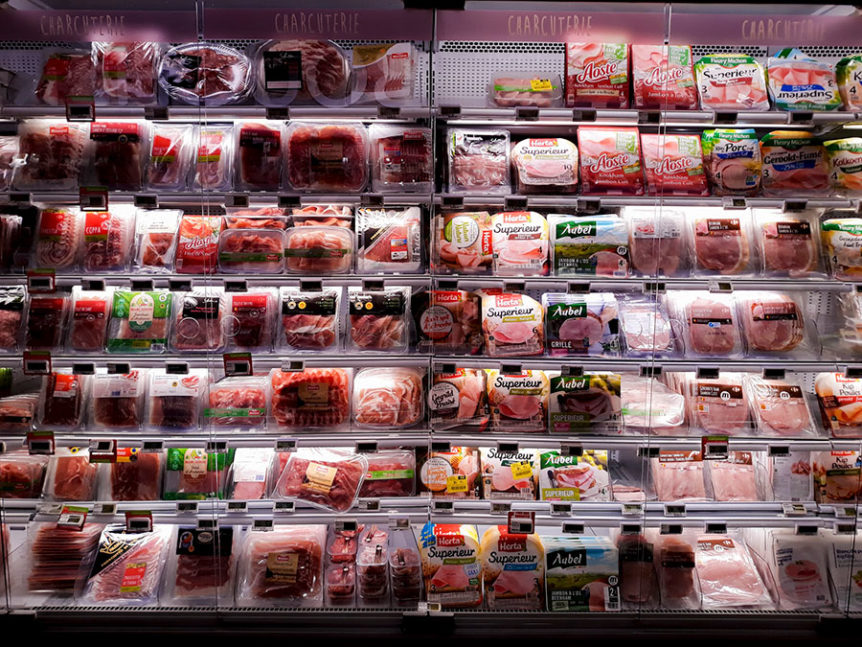- Like
- Digg
- Tumblr
- VKontakte
- Buffer
- Love This
- Odnoklassniki
- Meneame
- Blogger
- Amazon
- Yahoo Mail
- Gmail
- AOL
- Newsvine
- HackerNews
- Evernote
- MySpace
- Mail.ru
- Viadeo
- Line
- Comments
- SMS
- Viber
- Telegram
- Subscribe
- Facebook Messenger
- Kakao
- LiveJournal
- Yammer
- Edgar
- Fintel
- Mix
- Instapaper
- Copy Link
Taco Bell has been making headlines, but not for its new vegetarian-friendly menu. The enormous fast-food chain has instead issued a recall of 2.3 million pounds of seasoned beef because it was possibly contaminated with “extraneous materials, specifically metal shavings.”
As a former undercover investigator, I can attest to the fact that this isn’t actually that crazy a possibility. I’ve seen things behind the closed doors of the slaughterhouse that would make even the most daring eaters turn away from meat products. And yes: metal in meat is something slaughterhouses watch out for.
I’m standing in front of a conveyor belt, in a brightly-lit room, as shrink-wrapped plastic packages of ground lamb meat whiz past me. I’m in the processing part of a lamb slaughterhouse, where thousands of these packages are sent to retail stores every day. It is a slaughterhouse like any other: fearful animals pass through the hands of stressed workers to be turned into “food” for consumers and profit for corporations.
To get to this point, this meat was sliced from the body of a lamb who was alive just days ago. The body was then refrigerated for several days to slow the growth of bacteria and then sent through worker and heavy machinery processing. How much metal did this meat pass by? Could any have gotten into the product? You’d be shocked: machinery breaking during processing can cause metal pieces like shavings or mesh to fall into the products going by. In 2018, 29,000 pounds of Jimmy Dean sausage were recalled after string-like metal pieces were found. In 2017, nearly 5,000 pounds of beef stew from Swift were recalled after both metal and plastic were found.
In fact, there’s been an uptick in recent years of food recalls due to the presence of foreign materials in products. The USDA’s Food Safety and Inspection Service (FSIS) which is responsible for overseeing slaughterhouses (including food safety and animal welfare), recently issued a best practice guideline designed to help the meat and poultry industries respond to customer complaints about adulterated or misbranded products. This guideline serves as a renewed effort to better educate processors on what constitutes an adulterated product (any foreign matter, regardless of whether it is physically hazardous or not).
It’s not surprising that this guideline is necessary. In the last year, the USDA issued 23 recalls for “extraneous material,” compared to 6 recalls in 2014. During my investigation of a lamb slaughterhouse in 2016, I saw firsthand how foreign materials might make it past the production line and end up in customers’ hands. Workers were constantly rushing to keep up with fast line speeds. Boxes of product were supposed to pass through a metal detector as a safety protocol, but because they weren’t packed quickly enough after the metal detector, they ended up piling up at the end of the conveyor belt. To speed up the process, workers would often take products off the line, box them, and carry them around the metal detector right to the weighing station. Even the supervisor would jump in occasionally and pack products that hadn’t been checked yet.
Time and again, Compassion Over Killing investigations show that the industry treating animals like objects to maximize profits and fast line speeds only getting faster, can lead to dangerous shortcuts. It’s up to us as consumers to decide whether we should support companies that do not care enough about customer safety to properly follow their own safety plans.
By choosing delicious vegan foods we can rest easily knowing that we are making safer and more compassionate choices.
For help making your next meal a vegan one, visit TryVeg.com.
– Scott David, Compassion Over Killing Investigations Associate


Comments 2
Wow, it never would have occurred to me that there has been an uptick in food recalls because of the presence of metals and foreign materials. Since this has become a problem, it might be a good idea to carry some kind of metal detecting device so that you can prevent yourself from eating harmful materials. I would imagine that the technology for making small metal detecting devices exists.
I am so glad I read this article. Yesterday I was at McDonalds in Central Train Station in Brisbane and found a piece of metal in my burger. It had 2 prongs on the end of it sharp as a pin at the end it is lucky I didn’t swallow it or have it go through the roof of my mouth it was that sharp. Who knows where it came from if it was machinery or something else. I can’t believe they don’t compensate consumers for hazardous foreign metal in food. Who knows what it could of done if I had swallowed it caused internal bleeding or ruptured some part of the body, or become embedded somewhere. It’s put me off fast food outlets.